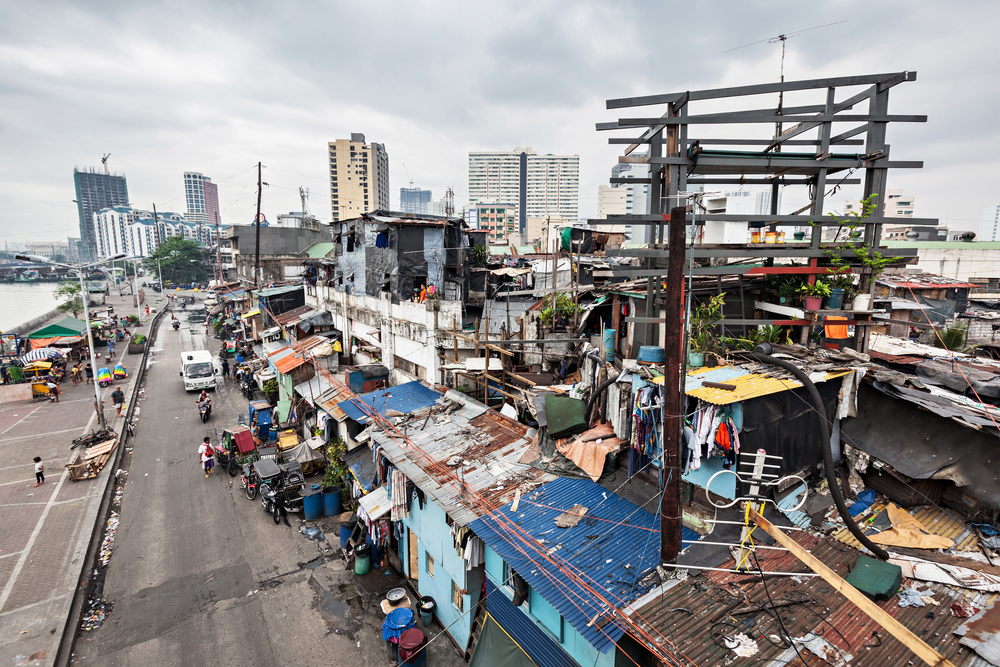Headline
Philippine poor get hit early in Duterte inspired crackdown

Metro Manila slums (Saiko3p/Shutterstock)
MANILA, Philippines—In a crackdown bearing the Philippine president-elect’s name, police have rounded up hundreds of children or their parents to enforce a night curfew for minors, and taken away drunk and shirtless men roaming metropolitan Manila’s slums. The poor, who were among Rodrigo Duterte’s strongest supporters, are getting a foretaste of the war against crime he has vowed to wage.
During a surprise sweep witnessed by The Associated Press last week, a girl who appeared to be about 10 years old was dragged to a police van for curfew violation. She protested that she had been outside only to take out the garbage. A boy about the same age cried, “I do not want to go!” A slightly older-looking boy, looking terrified, dropped the box of a rice and beef meal he’d just bought when police apprehended him.
A bewildered mother sleeping on a sidewalk with her toddler wailed when a social worker took her son, and she was dragged to a police vehicle. “Where is my child? I will go crazy here!” she shouted, pleading with police to “please have mercy on me.”
The woman wore a rubber bracelet bearing Duterte’s name. She relaxed when a social worker brought her son to the same vehicle.
The crackdown is dubbed “Oplan Rody.” Oplan is short for operation plan, while Rody is both an acronym for “Rid the Streets of Drinkers and Youth” and the nickname of Duterte, who becomes president June 30.
In the weeks since the tough-talking mayor of southern Davao city won the presidential election, energized police and local officials have dusted off little-enforced city ordinances like night-to-dawn curfews for minors, a ban on drinking alcohol in the streets and shirtless men in public places.
Rolando Roxas, father of a 14-year-old boy apprehended while buying noodles, said it’s probably a good lesson for the children not to roam the streets at night.
But Jocelyn Chavez is angry. She is a small-time vendor who works at night to support her five children, and she had to forego her day’s earnings to get her daughter, who she said was picked up while taking out the garbage. “If I don’t work we will all have nothing to eat,” she said.
Apprehended minors are turned over to social workers and most are released to their parents with warnings. Adults caught drinking alcohol outdoors are warned the first time and can be fined, detained or both the next, said Police Chief Inspector Bernabe Irinco Jr., who led the Manila operations.
“We are doing this so our young people can be free of crimes,” Irinco said.
Tough talk on crime helped Duterte win the May 9 election by a wide margin and has resonated with the poor, whose neighbourhoods suffer the most from drugs and related crimes. Human-rights watchdogs fear his promise to replicate crime-fighting measures he used in Davao may lead to widespread rights violations.
Duterte has repeatedly vowed to kill drug criminals, but denies allegations he was involved in killings of alleged criminals in his city by motorcycle-riding assassins known as the “Davao death squads.”
At his victory party in Davao, he encouraged citizens to shoot and kill drug dealers who resist arrest and fight back in their neighbourhoods. He offered bounties to the police and military for the capture of drug lords “dead or alive.”
“My payment for a drug lord, if killed, is 5 million (pesos, or $109,000). If alive, it’s only 4.999 million,” he told supporters during his victory party.
Several killings since Duterte’s election have borne marks of vigilante justice. The Philippine Daily Inquirer reported on five of them in three central provinces earlier this month. A piece of cardboard beside one body stated that the dead man was a thief and a drug addict.
Last month, at least five suspected criminals were reportedly killed by gunmen in Davao, and other bodies have turned up elsewhere in the country.
Other local officials are applying their own brand of justice. One mayor in a town south of Manila parades suspected drug pushers around town to shame them. Another in the central Philippines has offered police 50,000 pesos ($1,000) for every criminal killed.
Duterte’s pick to head the national police, former Davao police chief Ronald dela Rosa, supports nationwide implementation of the Manila program if a law provides for it.
He also lauds the other mayors’ campaigns because “at least they are doing something, unlike other local chief executives who play blind and deaf to the problem of drugs in society, some even contributing to the drug problem.”
At an earlier news conference, he described how he expects police to confront drug criminals: “If they put up a fight, we will kill them. If they don’t put up a fight, we will fight with them. If they do not fight back, they will live.”
Asked during a television interview about due process to be accorded to a drug criminal, Dela Rosa said with a smile: “he will be given the right to remain silent … forever.”
Loretta Ann Rosales, former head of the Commission on Human Rights, said Duterte’s loose talk threatens the rule of law and “brings out the beast” in law enforcers and officials.
“I don’t think we should keep silent on summary killings that go on in the process of this so-called anti-crime drive,” she said. “That to me has to be addressed very strongly and people should not take it complacently.”





















